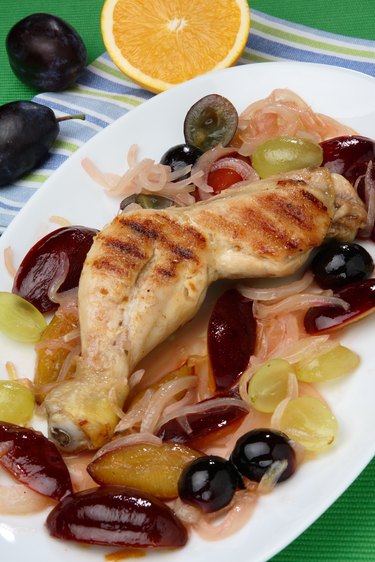
The acid-ash diet is based on the idea that you can alter the composition of your diet to change the pH of your urine -- in this case, making it more acidic, which may help eliminate some types of kidney stones. Animal proteins and grain-based items are central to the acid-ash diet, with very limited amounts of fruits and vegetables.
"Acid-Ash" Defined
Video of the Day
Minerals from food that are not oxidized during metabolism leave an ash, or residue, in the urine. An acid ash is formed from phosphorus, chloride and sulfur, whereas alkalinity comes from sodium, potassium, calcium and magnesium. A calculation model was developed in 1995 by Thomas Remer, Ph.D., and Friedrich Manz, M.D., to determine the extent to which a food affects urine acidity. According to the Academy of Nutrition and Dietetics, a food is considered an "acid-ash" food based on the ash produced after the "combustion of foods under laboratory conditions." Combustion is meant to be comparable to what would occur through metabolism within the body and is used to suggest which foods will produce the desired "ash."
Video of the Day
Allowed Foods
The acid-ash diet mainly comprises moderate- and high-protein foods like fish, shellfish, meats, eggs, cheese and grains. According to the Food & Nutrition Encyclopedia, roast beef, chicken, ham, lamb, pork, veal and bacon qualify as acid-forming animal proteins. Some plant-based protein foods are permitted as well, including peanuts, Brazil nuts, walnuts, corn and lentils. As far as grains go, foods made from rye, white and whole-wheat flour are acceptable, including bread, cakes, cookies, crackers and pasta. Cereals like cornflakes, farina, oatmeal, puffed wheat or rice and shredded wheat are also commonly suggested. Further, while most fruits must be avoided due to their alkaline-ash product, cranberries, plums and prunes contain acids that remain unprocessed and contribute a net acid ash.
Foods to Avoid
Like most fruits, many vegetables should be avoided on this plan, especially beets, beet greens and many other leafy green vegetables like Swiss chard, dandelion greens, kale, mustard greens, spinach and turnip greens. Also, while many other animal proteins are essential on the acid-ash diet, milk creates an alkaline ash and should not be consumed. Molasses, almonds, chestnuts and coconut are off-limits as well. All of these foods form an alkaline ash and produce the opposite effect of what the acid-ash diet seeks to create.
Neutral Foods
Some items -- especially highly refined foods -- do not create an ash, so they have little to no effect on urine pH. These foods and drinks will not be beneficial or detrimental to an individual's efforts to follow the acid-ash diet. Among these items are arrowroot, tapioca, coffee and tea. The other foods considered to be neutral are mainly high-fat and high-sugar. Although they are allowed on the acid-ash diet, they offer a lot of calories and very few valuable nutrients. Therefore, consume them only in moderate amounts. Some examples of these foods include butter, margarine, oils, sugar, syrups, honey and plain candies.
- Journal of the American Dietetic Association: What Impact Does pH Have on Food and Nutrition?
- Nutrition 411: Acidity and Alkalinity of Foods
- Today's Dietitian: Ask the Expert
- Foods & Nutrition Encyclopedia, Two Volume Set; Marion Ensminger and Audrey Ensminger
- Nutrition and Diet Therapy Reference Dictionary (4th Ed.); Rosalinda Lagua and Virginia Claudio